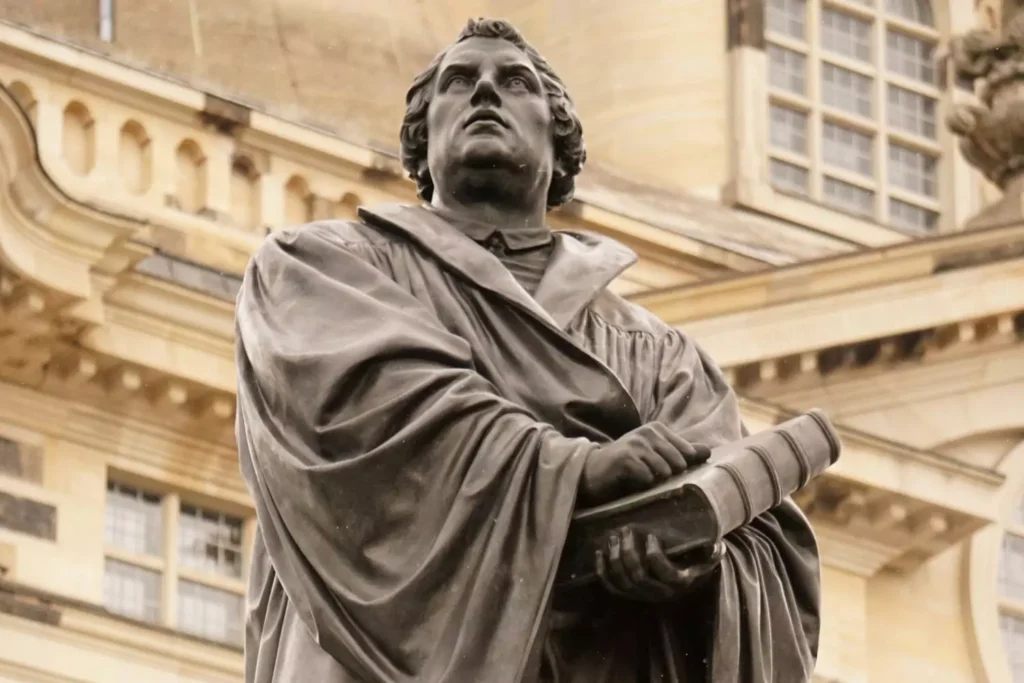October 31, 2017 was an important day in Christian church history – the 500th anniversary of the Protestant Reformation.
What is the Reformation?
On October 31, 1517, a German named Martin Luther, a 33-year-old professor and Catholic monk, nailed his 95 theses on the Wittenberg Castle Church and mailed a copy to his church superior. His initial intent was not to start a revolutionary split from the Roman Catholic Church. Luther’s aim was to encourage his fellow scholars to debate church practices he found to be problematic, gain the attention of church authorities and ultimately promote a return to historic Christianity.
Specifically, Luther’s theses centered upon the corrupt sale of indulgences — certificates transferring the good works of saints in heaven to common people on earth. Their purpose was to reduce the amount of time a person spent in purgatory, a place the church mistakenly believed one’s soul dwelt upon death to be purified from sin before entering heaven. Essentially, people were convinced that they needed to pay money to gain absolution and forgiveness instead of believing in and accepting God’s free gift of salvation.
Keep in mind that devout Catholics in Martin Luther’s day were seeking to please God and the church, the vast majority unaware that certain beliefs and practices were amiss. Medieval church-goers heard the mass in Latin, a language only the educated would know and understand. Also, the general population did not have access to printed Scripture in their own language. Congregants in Luther’s Germany trusted their leaders and the structure of the church, having no means to question or fact-check what was being taught.
Luther’s bold stance began a movement that profoundly changed the western Christian church.
Additional leaders in Europe were influenced and followed suit from 1517-1648, re-affirming the traditional Christian teachings on sin, grace, forgiveness, salvation and eternal life. Huldrych Zwingli, John Calvin, Thomas Cranmer and John Knox, among others, began to preach systematically in the common languages of their congregations, translate and publish Scripture, and even incorporate congregational singing into the worship service. Their confessions and articles led to the formations of the Lutheran, Reformed, Anglican, and Presbyterian denominations, dividing Europe’s Christians into Protestants and Catholics.
It was a season ripe for change, as economic, political, educational and cultural movements were occurring simultaneous to religious shifts, bringing Europe from the Middle Ages into the era of the Enlightenment.
Commitment to Scriptural Christianity
The Reformation’s main aim was to purify the beliefs and practices within the church. The Five Solas are Latin phrases that emerged during the Reformation to unite Christians over the essential Christian doctrines. Conversely, they also stand as a corrective to any belief or practice outside the main tenets of Christianity.
Sola Scriptura (“Scripture alone”)
Sola Fide (“faith alone”)
Sola Gratia (“grace alone”)
Solus Christus (“Christ alone”)
Soli Deo Gloria (“to the glory of God alone”)
Although all five are critically important, I can’t help but think, in light of this anniversary, about our own need to commit or re-commit to the importance of Scripture – Sola Scriptura – as our guiding authority in the Christian faith.
We have it so easy compared to the men and women of the Middle Ages. Although there are exceptions, the vast majority of people in the Western world today can read the Bible in our own languages thanks to widespread educational advances. We also have multiple points of relatively inexpensive access – from translated and bound Bibles, to apps on our phones, to websites. Additionally, most of us have Bible study resources and opportunities to study Scripture together with other believers.
Furthermore, we have freedom to worship God in the way we please. Instead of living under a state religion, forced to follow one particular type of Christianity as in Martin Luther’s day, we have choices. We ought to pause and give thanks to God and pray for those whose own access and/or freedoms are still limited, unavailable or forbidden today.
So, given these great privileges, do we as Christians trust the Bible as sufficient? Do we adhere to what it says even when passages are challenging and obeying them costs us something – whether reputation, relationships or otherwise? Do we have the courage to act upon biblical convictions and speak up, challenging the status quo and corrupt power structures of our modern world?
How should we honor the Reformation today?
The church is always being reformed, because the church is made up of imperfect people. After all, it wasn’t simply one medieval-era pope and his leaders who’ve been wrong about something. Christians can – and do – fall into error. The people of God and the church of God need to remain open to correction and committed to the process of ongoing sanctification, returning, time and time again, to the Word of God.
Dr. Michael S. Horton of Westminster Seminary summarizes this concept well.
It is not because the culture is always changing and we need to be up with the times, but because we are always in need of being re-oriented to the Word that stands over us, individually and collectively, that the church can never stand still. It must always be a listening church. “Faith comes by hearing, and hearing through the Word of Christ” (Rom. 10:17).
Studying the Reformation has been a good reminder to pay close attention to the condition of my own heart, and re-affirm my confession. The reformers took a needed stand at great personal cost. Today, on the 500th anniversary, let’s honor their work and sacrifice by also making a lifelong commitment to biblical truth.
Copyright 2017 Lindsay Blackburn. All rights reserved.











